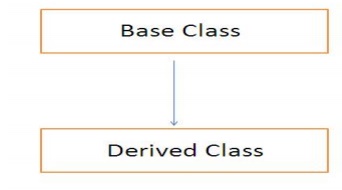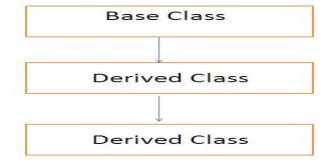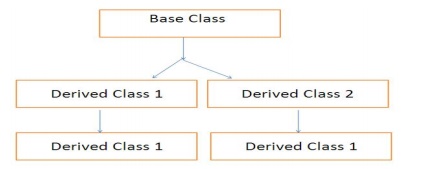Chapter: C# and .NET Framework
Inheritance in C#
INHERITANCE IN C#.
Inheritance
means parent-child relationship.By using Inheritance methodology we can create
a new class by using existing class code (i.e. reuse existing methods,
properties etc).It also referred to as reusability of the code so by using
Inheritance we can reuse the code again and again.
What We Call
In
Inheritance main existing class is called as generalized class, base class,
super class and parent class and the new class created from existing class is
called as specialized class, sub class, child class and derived class. We
normally talk in terms of base class and derived class.
Syntax of Inheritance
class
ParentClass{
...parent
class code
}
class
ChildClass : ParentClass{
...child
class code
}
Special Character ":" in
Inheritance
Inheritance uses special character called
":" colon to make a relationship between parent and child as you can
see in above syntax of code.
When to Implement Interitance
When we create a new class and we want to
reuse some of the methods or properties from existing class then that is an
ideal time to implement inheritance.
Advantage of Interitance
Reusability
of the code.
Types of inheritance in c#
There are
5 types of inheritance as shown below.
·
Single Inheritance
·
Multilevel Inheritance
·
Multiple Inheritance
· Hierarchical Inheritance
·
Hybrid Inheritance
Single Inheritance
Single
Inheritance means when a single base is been implemented to single derived
class is called as Single Inheritance. Means we have only one parent class and
one child class.

Example of Single Inheritance
class
Company{
public void CompanyName(){
Console.WriteLine("Name of the Company");
}
public void CompanyAddress(){
Console.WriteLine("Address of the Company");
}
}
class Employee : Company { public void
NameofEmployee(){
Console.WriteLine("Name
of the Employee");
}
public void Salary(){
Console.WriteLine("Salary of the Employee");
}
}
Multilevel Inheritance
When a
derived class is created from another derived class or let me put it in this
way that a class is created by using another derived class and this type of
implementation is called as multilevel Inheritance

Example of Multilevel Inheritance
class
HeadOffice
{
public void HeadOfficeAddress(){
Console.WriteLine("Head Office Address");
}
}
Now let's
assume that class "HeadOffice" is our Parent class or Base class. Now
in my next step i will create one derived class.
class
BranchOffice : HeadOffice{
public void BranchOfficeAddress(){
Console.WriteLine("Branch Office Address");
}
}
So as you
can see that i have created a derived class "BranchOffice" by
implementing the class "HeadOffice" to it.
It means
now we have one parent class and one derived class. In the next step i will
create another derived class by implementing our existing derived class "BranchOffice"
to achieve multilevel Inheritance.
class
Employee : BranchOffice {
public void NameofEmployee(){
Console.WriteLine("Name of the Employee");
}
public void Salary(){
Console.WriteLine("Salary of the Employee");
}
}
From the
above souce code you can see that we have achieved multilevel Inheritance by
implementing one derived class to another derived class. Now the class "Employee" will have the access of
all the properties and methods of class "BranchOffice" and class "HeadOffice".
Multiple Inheritance
Due to
the complexity of a code multiple inheritance is not been supported in C# or in
DOT.NET but DOT.NET or C# supports multiple interfaces.
Hierarchical Inheritance

When more
than one derived classes are implemented from a same parent class or base class
then that type of implementation is known as hierarchical inheritance.
In short
it means single base class having more than one derived classes. class
HeadOffice
{
public
void HeadOfficeAddress()
{
Console.WriteLine("Head
Office Address");
}
}
class
BranchOffice1 : HeadOffice
{
public
void BranchOfficeAddress()
{
Console.WriteLine("Branch
Office Address");
}
}
class
BranchOffice2 : HeadOffice
{
public
void BranchOfficeAddress()
{
Console.WriteLine("Branch
Office Address");
}
}
As you
can see from above the code that we have one base class "HeadOffice" and two derived
classes "BranchOffice1"
and "BranchOffice2" which
are implemented from same base class i.e. "HeadOffice".
Hybrid Inheritance
This is a
special type of inheritance and can be achieved from any combination of single,
hierarchical and multi level inheritance known as hybrid inheritance.

In the
below code example i have combined hierarchical inheritance and multi level
inheritance together.
class
HeadOffice{
public void HeadOfficeAddress(){
Console.WriteLine("Head Office Address");
}
}
class
BranchOffice1 : HeadOffice{
public void BranchOfficeAddress(){
Console.WriteLine("Branch Office Address");
}
}
class
BranchOffice2 : HeadOffice{
public void BranchOfficeAddress(){
Console.WriteLine("Branch Office Address");
}
}
Related Topics